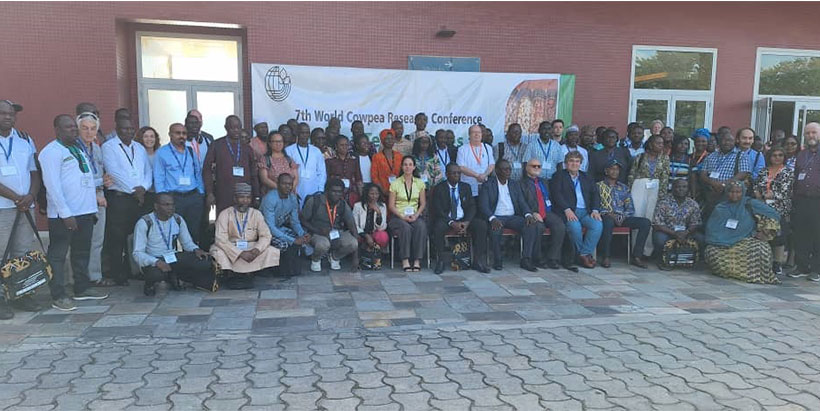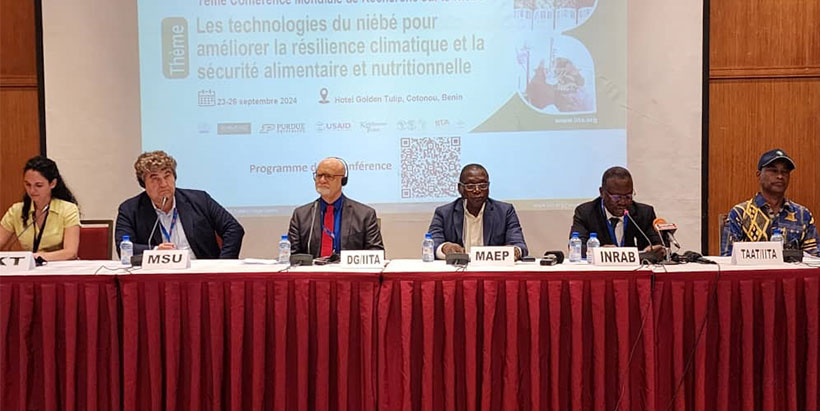11 October 2024
Cowpea, an indigenous crop to Africa, is vital for its protein-rich grains, constituting up to 25% of its dry weight. This makes it a crucial protein source in many African diets, which are predominantly based on starchy foods like cassava, yam, potato, plantain, and cereals such as sorghum, millet, maize, etc. Cowpea grains are rich in antioxidants that contribute to a healthy diet. It is primarily cultivated in the dry savannah regions of sub-Saharan Africa, areas that are often affected by drought and high temperatures. Despite these challenging conditions, cowpea thrives better than many other crops.
 Participants at the conference.
Participants at the conference.
Between 23 and 26 September, participants from around the world gathered in Cotonou, Benin, for the 7th World Cowpea Research Conference (WCRC). This conference provides a platform for cowpea scientists to interact, discuss their research findings, and exchange mutually beneficial ideas. The conference, themed “Cowpea Technologies for Enhancing Climate Resilience, Food and Nutritional Security,” featured oral presentations, poster displays, and exhibitions of cowpea processing equipment fabricated in the country.
In his welcome and goodwill address, IITA Deputy Director General, Partnerships for Delivery (DDG-P4D), Kenton Dashiell, representing the IITA Director General, Simeon Ehui, emphasized the importance of the conference. He highlighted that it unites scientists, donors, and those who bring cowpea to farmers, fostering discussions on improving research, delivery, and scaling efforts to benefit millions through cowpea research.
Michael Abberton, the Director of IITA West Africa Hub and Head of the Genetic Resources Center, emphasized the critical role of the gene bank, especially concerning cowpea. He highlighted that IITA boasts the world’s largest and most diverse cowpea collection, with over 16,000 different accessions and around 1,000 accessions of cowpea relatives. “This invaluable resource has been instrumental for breeders in addressing climate change challenges by developing more drought-tolerant and heat-tolerant seeds,” he stated. Abberton also noted that the IITA gene bank employs various approaches to identify genes within specific accessions that could enhance the cowpea breeding program.
 Panelists at WCRC 2024.
Panelists at WCRC 2024.
Patrick Ongom, a molecular breeder at IITA, discussed the latest technologies developed to tackle the challenges impacting cowpea productivity, which are worsened by climate change, leading to drought and heat stress. “We have been creating new tools to speed up the breeding process for these stress factors affecting cowpea production. By leveraging recent genetic advancements, we are developing molecular markers to identify genes that control traits related to heat stress, drought, and various diseases. These markers enable us to swiftly select varieties that are tolerant to these stresses,” he explained. Ongom further emphasized that these technologies are efficient, allowing breeders to quickly select and develop varieties that can be promptly distributed to farmers.
During the four-day event, Sir Edwin Southern, a distinguished molecular biologist, emeritus professor of Biochemistry, and fellow of Trinity College at the University of Oxford, received an honorary award. Southern has made significant contributions to research aimed at improving leguminous crops in semi-arid regions of India and East and West Central Africa. He has been instrumental in developing various important but neglected leguminous crops in Africa. As the founder of Oxford Gene Technology Limited, he has supported research through direct funding, infrastructure development, and capacity building. His efforts have empowered scientists to enhance their professional skills, enabling them to conduct vital research that addresses nutritional security across the continent.
The conference was highlighted by presentations that explored various topics, including research and innovation, climate resilience, food and nutritional security, sustainable practices, collaboration and impact, and future directions.
IITA is a leading global hub for cowpea research, boasting the world’s largest collection of cowpea germplasm. These seeds are freely available to requesters worldwide. IITA also excels in integrated pest management research, emphasizing genetic improvements for host plant resistance and using natural enemies, such as parasitoids, to mitigate pest issues in cowpea fields. IITA scientists conduct extensive studies on cowpea field management across various African nations. These initiatives are carried out in close partnership with national agricultural research systems (NARS) in sub-Saharan Africa and advanced research institutions (ARIs).